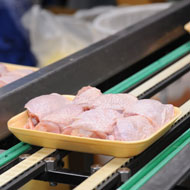
FSA publishes last results for top nine retailers
Campylobacter levels in fresh, shop-bought chickens have fallen to 54 per cent, according to the third annual survey by the Food Standards Agency (FSA).
This survey will be the FSA’s last to include the UK’s top nine retailers, who will publish their own results going forward. Future FSA surveys will focus on smaller retailers, independent traders and market stalls, which have not shown the same level of improvement.
The latest survey shows 5.6 per cent of chickens from the top nine retailers tested positive for the highest level of contamination. However, the ‘others’ group which consists of smaller retailers and butchers had a significantly higher prevalence at 17.1 per cent.
Morrisons, Tesco and Waitrose had significantly lower prevalence than the average among all retailers, at 2.9 per cent, 4.2 per cent and 2.7 per cent respectively.
Across the market, the figure is 6.5 per cent, down from 19.7 per cent when records began in 2014/15.
The overall percentage of chickens to test positive for any level of campylobacter was 54 per cent, down from 73.2 per cent in 2014/15.
The survey is based on 3,980 whole, fresh, UK-produced chickens that were sampled at retail.
FSA chair Heather Hancock commented: “The full year’s results from our third annual survey show the significant progress the industry has made in reducing campylobacter levels in chicken, compared with their starting point. The major retailers are now taking on the responsibility to publish their own results, according to a protocol we have agreed. This is a welcome step towards greater transparency.
“Whilst we will keep a close eye on the performance of bigger retailers, it means the FSA can now focus our efforts on smaller establishments, where we haven't yet seen the same level of improvement and where more progress needs to be made.”
The nine retailers will now publish their results on their consumer websites. Sampling and analysis will be carried out in accordance with robust protocols laid out by the FSA, so results will be comparable. FSA says it will have access to the raw data and will have the right to comment publicly on the results.



 RCVS Knowledge has welcomed Professor Peter Cockcroft as editor-in-chief for Veterinary Evidence.
RCVS Knowledge has welcomed Professor Peter Cockcroft as editor-in-chief for Veterinary Evidence.